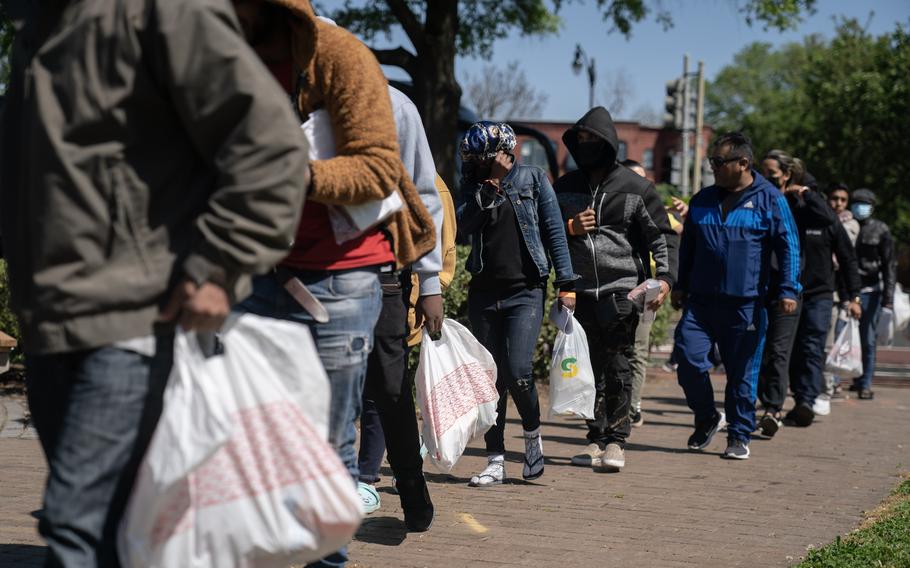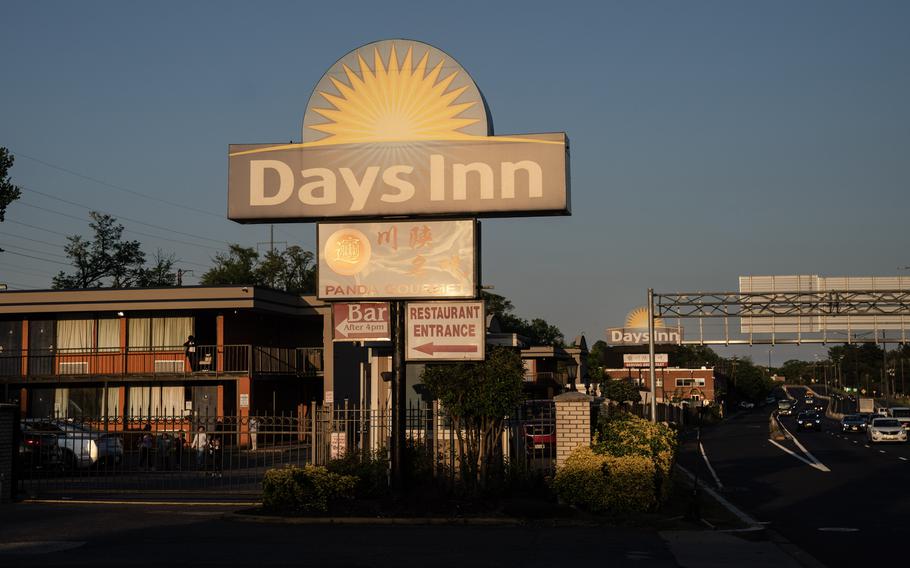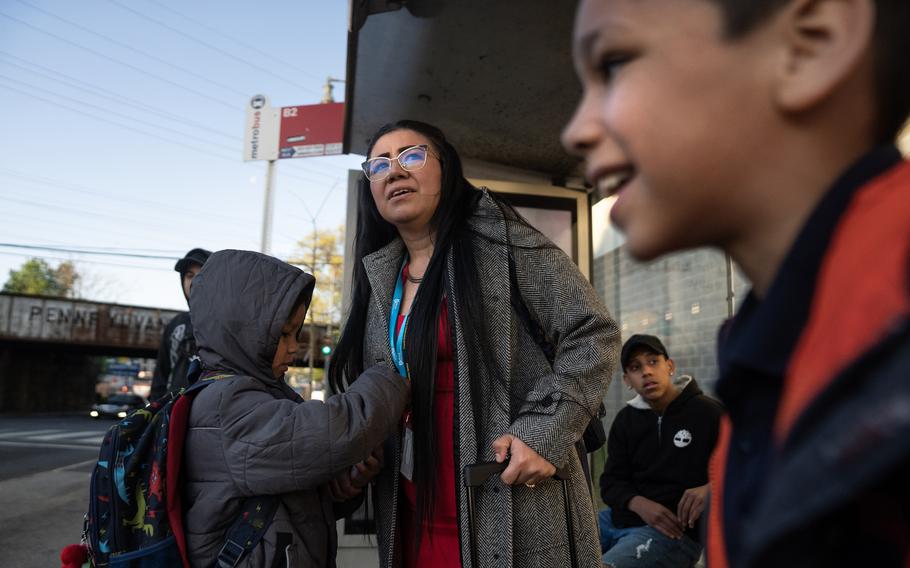
Migrants hold their belongings after arriving in D.C. on a bus from Arizona on April 18. More than 170 buses have arrived from Arizona and Texas so far, in what began as a protest in April 2022 by Republican governors over President Joe Biden's border policies. (Michael Robinson Chávez/The Washington Post)
WASHINGTON — Over a year since busloads of migrants began arriving from Texas and Arizona, D.C. Mayor Muriel E. Bowser’s administration faces a costly predicament: housing and feeding those families at a time when city resources are strained, and an expected surge of border crossings probably means more of those chartered buses coming.
More than 170 buses have arrived in the District from the two states so far, including two from Texas last week, in what began as a protest in April 2022 by Republican governors over President Biden’s border policies. The resulting images of families seeking U.S. asylum sleeping on city streets jolted the immigration debate.
While the pace of arrivals has slowed in recent months, illegal border crossings are expected to surpass 10,000 per day after the Biden administration lifted the pandemic-era Title 42 border policy Thursday. And migrants in search of aid are now also arriving in the District on their own by car, plane or commuter bus after failing to find stability in other U.S. cities.
Meanwhile, efforts to find long-term housing for families temporarily housed in three hotels contracted by D.C. have sputtered in the region’s pricey housing market, with many of the migrants unable to find steady work, immigrant advocates say. As a result, the problem that D.C. officials initially believed to be temporary has only gotten more complicated.
“Primarily, there is just a lack of finding affordable housing in the area,” said Sharlet Ann Wagner, director of the Catholic Charities Archdiocese of Washington’s Newcomer Network. “You’ve also got a population that may not have a bank account, doesn’t have a credit history, may not have the IDs, and so it could be hard to rent a place without all of that documentation.”
With expenses for lodging, food and other services climbing well past the $10 million that Bowser (D) initially set aside for the agency she formed last fall to help the migrants, her administration temporarily closed the hotels to new arrivals late last month, saying there was no more room.
The move deepened uncertainty over how the District and other U.S. cities facing similar pressures can manage the continuing influx — a situation breeding resentment far from the border. In New York, for example, Mayor Eric Adams (D) came under fire from leaders of surrounding counties earlier this month after announcing plans to send as many as 300 willing migrants to their communities in anticipation of the surge.
“I don’t think anybody could tell you where we’re going,” D.C. Council member Robert C. White Jr. (D-At Large) said, noting that the city is facing budget cuts to programs designed to serve its existing poor and homeless population.
“Our job is to do the best we can to serve them and to remember that there are also a lot of folks already here who are struggling,” he said. “That’s a tough balance, but that is where we are.”

For families who arrive in D.C. and want to stay in the area, "home" has often become a hotel such as Days Inn. (Michael Robinson Chávez/The Washington Post)
The hotels
For families who arrive in D.C. and want to stay in the area, “home” has often become one of the hotels in the city, or another one in Montgomery County that houses about 16 families. As the District’s hotel population climbed toward 1,250, with 340 children enrolled in D.C. public schools, the city in February added a third hotel to the mix.
Meant to be a stopgap measure to keep the migrants from sleeping on the streets, city officials estimate the average stay is 126 days at the courtyard buildings clustered on New York Avenue in Northeast.
So far, the city’s new Office of Migrant Services has spent more than $15.1 million on hotel lodging, food and other services, according to the Department of Human Services (DHS), which oversees the agency.
The expenses are projected to climb to $52.5 million by October amid expectations of another surge, DHS said, undermining the city’s efforts to close an estimated $1.7 billion budget gap over the next five years caused largely by the economic effects of the coronavirus pandemic.
“The number gets bigger every month, the longer people stay,” Laura Zeilinger, the city DHS director, told D.C. Council members during a March 31 budget hearing.
A contract with a soul food restaurant to provide three meals a day for the hotel families is budgeted for $3.6 million, while an agreement with SAMU First Response, a D.C. nonprofit, to coordinate mental health counseling and other services in the city is expected to cost $1.7 million, DHS said. Laundry at the hotels, covered by another contract, costs about $1.1 million, while security to keep outsiders out of the areas of the hotels where the migrants stay is budgeted for $4.5 million.
The cumulative hotel bill alone is projected to reach $12 million by October, DHS said.
Zeilinger told D.C. Council members that the city is seeking reimbursement from the Federal Emergency Management Agency. But less than half of what has been spent so far is eligible, she said, noting that FEMA covers only 30 days of temporary housing for the migrants.
“And people stay much longer than 30 days,” she said.
DHS, which declined an interview request, said in a statement that eventually D.C. employees will provide most of the services now provided to migrants, though the statement didn’t say how.
Montgomery County has spent $5 million so far, officials there said. Despite county aid with security deposits and first month’s rent, contractors there have also found it challenging to locate permanent homes for hotel residents, limiting the space available for newcomers.
The rising expenses are “a very legitimate concern,” D.C. Council Chair Phil Mendelson (D) said during a media briefing two weeks ago — particularly if a surge of border crossings means more migrants arriving to the city. An estimated 12% of migrants who come to D.C. indicate they plan to stay in the city.
Mendelson said Bowser’s office has not asked the council to approve more funding for the Office of Migrant Services, which has been operating on contingency funds and does not have an appropriated budget amount.
While the governors of Texas and Arizona have said that the migrants sent to the city volunteered to come, and many of the migrants themselves say they’ve found the free bus trips helpful, Mendelson nonetheless accused those states of treating the asylum seekers “inhumanely by just putting them on buses, sending them north.”
“This is a problem of humanity that the District wants to be responsive to but is not of our making,” he said.
Abél Nuñez, executive director of the Central American Resource Center, or Carecen, a D.C. nonprofit that helps the migrants with legal services and other matters, said assistance providers are walking a fine line between offering the migrants help and housing, while also encouraging them to leave that support behind.
“It’s a tricky thing because in one sense you want them to begin to integrate, but you don’t want them to integrate in a way where they don’t want to leave where they’re at, because that’s temporary housing,” said Nuñez, who has participated in discussions with city officials and other nonprofits about the issue.
“You can push them out, but they’ll just end up back in the government system, whether that’s the shelters or any of the other resources the city has for the unhoused or the poor,” Nuñez said.

Mandi Buada Rivera waits to ride a bus with her children Jahir Emanuel Buada, 9, left, and Javier Andres Buada, 7, during their morning commute to school in D.C. on April 11. Rivera and her family are staying at a D.C. hotel along with hundreds of migrant families. (Michael Robinson Chávez/The Washington Post)
Eager to leave
As days turn to weeks, then months for the migrants living at the D.C. hotels, a makeshift community has taken root there.
At one hotel, salsa rhythms poured from car stereos as clusters of men and women chatted in the full parking lot one recent night. Nearby, in the hotel’s asphalt courtyard, teenage boys played a loud game of stickball, as smaller children wobbled around the perimeter on donated bicycles.
And inside a banquet room at the Panda Gourmet restaurant, which sits in the same building complex, about 30 Latin American migrant children and teenagers practiced their English between bites of sesame chicken and shrimp fried rice.
“Niños, where are we going? We’re going to do ‘up,’” Mariajose Morales, 19, among the students at Georgetown University’s DC Schools Project who tutor the group, said in Spanish to her table.
She prompted the children to show that they understood which direction meant where in English. They pointed to the ceiling, pronouncing the word “up,” then demonstrated “down,” “left” and “right” while saying those words.
Despite the shelter and resources, some of the migrants are eager to leave, concerned about violent crime in the area and eager to begin their lives on their own. They said in Spanish that they felt the city hasn’t done enough to help them get out of the hotel and find another home.
“Nobody has said anything to us about that,” said Arianmi Ramírez, whose family of three has shared a hotel room with another family since arriving in October from Peru, where they lived for several years after leaving Venezuela.
DHS denied that assertion, saying in its statement that city contractors are “helping families identify pathways for long-term sustainability and self-sufficiency based on their needs, both inside and outside the region.”
Ramírez said that with help from volunteers from the Migrant Solidarity Mutual Aid Network, she and her husband have tried finding a place. So far, none of the rents have been within their reach.
“I would love to live in a house, but even an apartment with at least two rooms would be better,” said Ramírez, who supplements the income her husband receives from his temporary construction job by selling the Venezuelan snacks she prepares in the room’s tiny kitchenette to other hotel residents.
Plus, conditions at the hotels haven’t always been ideal. In late February, a group of residents complained to the D.C. Council about mold growing on the walls, bed bugs in the mattresses and the quality of the food they’re served, which they said has sometimes arrived spoiled.
“We’re suffering from poor nutrition, bites, irritation,” a resident who identified herself as Viviana M. told council members in Spanish during a Housing Committee hearing.
Those conditions have improved since that hearing, during which several council members expressed concern. White, who chairs the Housing Committee, said the improvements were evident when he recently visited the site.
“I have no doubt that they needed feedback and made adjustments,” White said, about city contractors.
He co-sponsored legislation approved by the council last month that requires the city to step up long-term resettlement efforts if the migrants choose to stay in the city and to grant them access to services available to other unhoused residents, such as baby formula for children.
“At the core of it, we have to recognize the folks who are coming here are people who are making the same decisions that we would make for ourselves and our families if we were in their position,” White said.
Bowser, whose office declined an interview request, allowed the emergency bill to go into effect late last month without signing it. Two weeks ago, the D.C. Council approved amendments to that law that, among other things, clarified the migrants’ eligibility for city services.

Georgetown University volunteer Angelina Torres calls on a child in a banquet room at Panda Gourmet restaurant during a tutoring session. The university's DC Schools Project helps about 30 Latin American migrant children and teenagers practice English. (Michael Robinson Chávez/The Washington Post)
A last resort
The changing, unpredictable manner in which migrants are now arriving is another complicating factor.
Illegal border crossings dropped after the Biden administration imposed restrictions under Title 42 that have kept Venezuelans, Cubans, Haitians and Nicaraguans seeking legal entry inside encampments in Mexico.
As a result, the number of buses coming to D.C. also went down. But with border crossing again picking up, Texas recently resumed sending its buses after a four-month lull, with two — carrying a total of 84 people — arriving at the Naval Observatory on Wednesday night and Thursday morning, local advocates said.
On Wednesday night, Abbott tweeted a statement about the state-charted buses, saying, “We will continue to provide this critical support to overwhelmed Texas border towns until Biden secures the border.”
Arizona, where Gov. Katie Hobbs (D) continued the busing program after taking office this year, sends about one bus per week, city officials said.
“Our border communities can’t handle this influx, and Texas will continue busing migrants to sanctuary cities to provide relief to our overwhelmed border towns,” Texas Gov. Greg Abbott’s (R) spokesman Andrew Mahaleris said in a statement sent before the state’s busing program restarted this month.
Meanwhile, migrants who either stayed in border towns after crossing or were bused to other U.S. cities are now arriving in D.C. through other means, after learning about the District’s system of support from friends or relatives who came earlier, immigrant advocates say.
On Monday, Bowser blamed some of the immigrant advocates, saying they’ve invited migrants to the city while misleading them about the amount of aid available. “They shouldn’t be communicating to Texas or anywhere else that there is unlimited space here because that is just not the case,” Bowser said when asked about the issue during a news conference.
But, those advocates say, many migrants are simply arriving at area churches or shelters without prompting from them.
In an increasing number of cases, families have turned to D.C. after struggling to find work and housing in other cities where they were bused, said Amy Hammond, a spokeswoman for SAMU First Response, which has become the city’s primary contact for the migrants. “They’re, you know, bouncing from one location to the next, trying to get that permanency that is a bit challenging to achieve,” Hammond said.
That was the case for Mandi Buada Rivera, who arrived in the District in December with her two sons — ages 7 and 9, with plane tickets from San Antonio bought by a D.C. church she found through a friend already in the city.
She picked D.C. randomly, while still traveling through Costa Rica. Another acquaintance who had arrived earlier told her about the city’s services in a text, said Rivera, who fled Venezuela in 2020 and lived in Colombia for three years.
“They were telling me that I would be taken care of,” she said of her friends’ messages about D.C.
Rivera — who has not yet applied for U.S. asylum after being granted humanitarian parole for a year — now sells Venezuelan snacks she also makes in her hotel room kitchenette as well as herbal shampoo she mixes in the sink in hopes of earning enough for a larger home. She also takes free English classes near her son’s school in Petworth, where they were placed amid a crush of migrant enrollments at schools closer to the hotels.
During a lunch break at the class, Rivera, 32, pulled from a bag the warm arepas she had made that morning — wrapped and filled with ground beef and cheese — and offered them to her classmates for $5 each.
She also took out large bottles of her shampoo, decorated with a “Mandi creations” label she designed and printed at a neighborhood library. “It’s how I got my hair like this,” Rivera said in Spanish to one woman, fluffing her long black hair. The classmate paid $15 for the mixture of ginger, aloe and coconut oil.
Such initiative helps but is no guarantee in a region that can be forbidding to new immigrants, particularly those without an established support network of compatriots in the area to lean on, advocates say.
Many migrants will probably need to rely on government aid for several more years, Nuñez said, adding that the influx will continue, particularly by Venezuelans, regardless of whether the border buses keep coming.
“The genie is out of the bottle,” he said. “We need to be comfortable with that. Now it’s about: OK, so what do we do if we know they’re coming?”